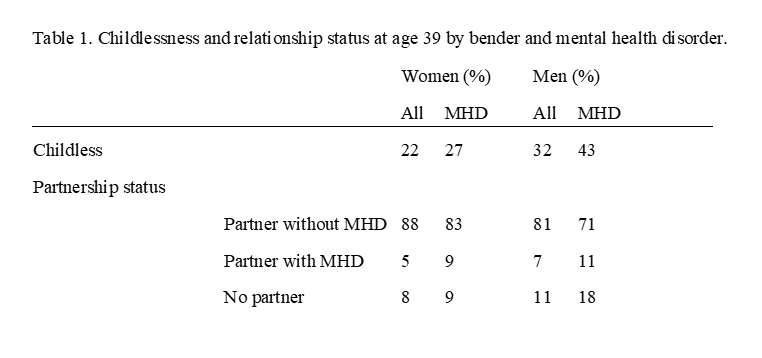Mental health disorders and childlessness – partnerships play a key explanatory role
Policy brief
1/2025
Sanna Kailaheimo-Lönnqvist & Mikko Myrskylä
Mental health problems have increased in Finland at the same time as birth rates have declined and lifetime childlessness has become more common. For example, the use of antidepressants has doubled in ten years, while lifetime childlessness has increased by ten percentage points (Finnish Medicine Statistics 2011; Finnish Medicine Statistics 2023; Jalovaara & Miettinen, 2023). However, little is known about the connection between these trends. Our recent research addresses this knowledge gap (Kailaheimo-Lönnqvist et al., 2024; Kailaheimo-Lönnqvist et al., ongoing study).
The main finding of the study is that mental health disorders are negatively associated with family formation, and that relationships play a key explanatory role in this association.
Key research findings:
- Mental health disorders are negatively associated with having children. In other words, individuals with a mental health disorder are more likely to remain childless (Table 1; Figure 1).
- The strength of the association varies across different mental health disorders. For example, depression has a weaker association with childlessness compared to psychotic mental disorders.
- The link between mental health disorders and childlessness is largely explained by relationship factors. Mental health disorders predict being single and experiencing separation, particularly among men.
- Mental health disorders and their effects accumulate. If a person has a mental health disorder, the likelihood increases that their partner (if any) does as well. Furthermore, childlessness is most common among couples where both partners have a mental health disorder.
What can society do?
Society can support individuals in achieving their desired number of children and help ensure that mental health problems do not prevent them from fulfilling their family aspirations.
Policy recommendations:
1. Effective early intervention for mental health problems is essential to prevent issues from accumulating and becoming chronic.
2. Comprehensive and accessible support measures should be available even before an individual or couple starts considering having children. The availability of support services influences whether people feel capable of starting a family.
3. Continuity of support after childbirth is crucial, as it reinforces confidence in family formation and achieving one’s desired number of children.
4. In practice, these support measures mean effective and high-quality mental health care as well as assistance in managing daily life. Important forms of everyday support include home services for families with children, household assistance and childcare support.



Figure 1. The association between mental health disorder and likelihood of having a child by relationship status. Event history model, results presented as predicted probabilities. Model control variables: age, education, student status, and number of partners. MHD = any mental health disorder.
How was the study conducted?
The study is based on comprehensive registry data covering all residents in Finland. Individuals, their relationships, and family formation were tracked from age 18 to 39. The analyses were conducted using event history methods.
More information:
Dr. Sanna Kailaheimo-Lönnqvist, Institute for Demography & Population Health, University of Helsinki | sanna.kailaheimo-lonnqvist@helsinki.fi, +358503083092
Kailaheimo-Lönnqvist, S., Moustgaard, H., Martikainen, P., & Myrskylä, M. (2024). Own depression, partner’s depression, and childlessness: A nationwide register-based study. Social Science & Medicine, 361, 117356.
Funding:
Kailaheimo-Lönnqvist has received support from the Strategic Research Council (STN), the FLUX consortium (grant numbers 345130, 345131, 364374, and 364375), the LIFECON consortium (grant number 345219), and the Jenny and Antti Wihuri Foundation.
Myrskylä has been supported by the Strategic Research Council (STN), the FLUX consortium (grant numbers 345130, 345131, 364374, and 364375); the National Institute on Aging (R01AG075208); grants from the Max Planck – University of Helsinki Center provided by the Max Planck Society (grant number 5714240218), the Jane and Aatos Erkko Foundation, the Faculty of Social Sciences at the University of Helsinki, and the cities of Helsinki, Vantaa, and Espoo; as well as the European Union (ERC Synergy, BIOSFER, 101071773).
The views and opinions expressed, however, are those of the authors and do not necessarily reflect the views of the European Union or the European Research Council. Neither the European Union nor the granting authority can be held responsible for them.
References:
Jalovaara, M. & Miettinen, A. (2024) Childlessness trends at different ages by educational attainment for men and women in Finland (preprint).
Kailaheimo-Lönnqvist, S., Moustgaard, H., Martikainen, P., & Myrskylä, M. (2024). Own depression, partner’s depression, and childlessness: A nationwide register-based study. Social Science & Medicine, 361, 117356.
Suomen lääketilasto (2011) Suomen lääketilasto 2010. Lääkealan turvallisuus- ja kehittämiskeskus Fimea ja Kansaneläkelaitos.
Suomen lääketilasto (2023) Suomen lääketilasto 2022. Lääkealan turvallisuus- ja kehittämiskeskus Fimea ja Kansaneläkelaitos.
